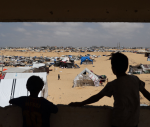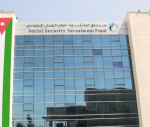You are here
The need of military and ideology approaches to extremism
Feb 11,2015 - Last updated at Feb 11,2015
At the rate of the current escalation of the conflict with Daesh, there is a strong feeling that the military part of this war will be largely won in 2015.
The anger that engulfed Jordan after learning of the heinous crime against pilot Muath Kasasbeh has certainly played a role in speeding up the military campaign, as the aerial attacks last week showed.
Talk of a ground war, possibly using Jordanian territory, is growing, possibly changing the conventional thinking that the ground war might begin first in Iraq, by its army.
The projected success of this military campaign, however, does not necessarily mean that the overall war on the so-called Islamic State (IS) and on extremism will be won.
Few have confidence in a similar success in the ideological war on extremism.
To succeed both militarily and ideologically, battles need to be fought simultaneously in order to ensure a holistic victory.
The rise of Daesh and the public profile of its self-appointed “caliph” provide the Arab and Western military with a clear and tangible target.
On the other hand, finding and defeating the intangible causes that prepared the welcoming environment for these extremists needs an effective strategy.
To fight ideological extremism in the Middle East, the main starting point must be youth who have been foot soldiers carrying out the extremist ideologies.
It is vitally important that
Arab/Muslim youth be given satisfactory answers to their economic, community and spiritual needs.
The challenge is difficult and there are no magic solutions. If a fraction of what is being spent to defeat Daesh militarily can be spent on providing economic opportunities, a major source of anger among youth can be eliminated.
Young people in the Middle East and North Africa are being added annually to the labour market, which is unable to provide them with enough jobs.
The IMF estimated in 2012 that at 25 per cent, the region has the highest rate of unemployment in the world. The situation has got worse since.
A look at the often tragic efforts of people from the MENA region to emigrate illegally to Europe is biggest proof of this problem.
From January to July 2014 alone 100,000 tried to illegally cross the Mediterranean.
This issue needs to be addressed from both sides of the Mediterranean.
In addition to providing jobs at home, Europe, which has an ageing population and many job opportunities, needs to loosen its policies to help share the burden of this huge number of unemployed Arabs and Muslims.
Arab countries in the MENA region must also institute major economic changes that can help absorb this growing, and naturally angry, new crop of unemployed youths.
Part of the vast wealth of the Gulf Cooperation Council countries, estimated at $1.7 trillion, could be invested in job-creating economies, rather than horded in sovereign funds or invested in the highest earning worldwide stocks and investments.
Western nations should also invest in such job-creation programmes in the MENA region, rather than waste their funds on new wars.
But giving angry Arab and Muslim youths jobs is not all that is needed. A strong effort must be exerted to satisfy the aspirations of young people who are able, through the information revolution, to see what living in a free and open society means.
Autocratic rulers and undemocratic policies carried in the name of security or of the fight against extremism further alienate these young people.
The Palestinian struggle, as well as the aspirations of minorities in various Arab countries, need to be addressed quickly in order to remove these poison-producing conflicts.
The fight against violent terrorism, as is the case in Egypt, should not be used to silence genuine forms of protest and opposition.
Perhaps most important in the ideological struggle is addressing the emotional and spiritual needs.
Arabs and Muslims feel that they are a defeated nation, and are easily excited when they see the short-term successes of organisations like Daesh.
Defeating extremists militarily without satisfying this yearning for success will further exacerbate the problem, even if it may buy some time.
Angry and defeated youth will no doubt latch onto the next group of extremists who will mesmerise them with short-term successes.
A positive, successful, role model must be provided to the youth as an alternative to the extremist models.
Young people looking for successful role models need genuine spiritual leaders who treat them with respect and address their intellect as well as their heart.
Such a level headed spiritual approach is lacking in the region and in the prevailing religion-controlled governments, a situation which makes renegade religious leaders popular and dangerous.
While the message to young people needs to be thought through and their needs effectively addressed, it is also important to use the right means of communication to reach out.
It is inconceivable that in the 21st century, when radical extremists use the latest IT digital communications tools, the good guys are still sending weak messages using analogue tools authored and approved by older men.
Both message and medium must be truly revolutionised if we are to have a chance to effectively reach the target audience.
The current war on extremism might very well end up with a military victory but an ideological defeat.
This means that the retreating and defeated extremists will look for another location and another time to restart their war.
A much better strategy would be to simultaneously win the military and ideological wars.
This will require effective out-of-the-box enlightenment thinking, hearing out (and not just listening to) what young people and the courageous political will wish to reverse the current situation which favours the wrong people and their disastrous, dark ideas.













